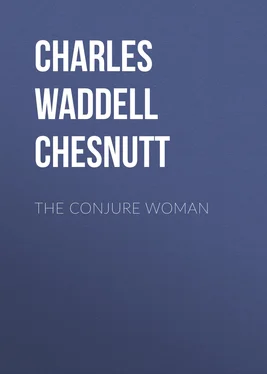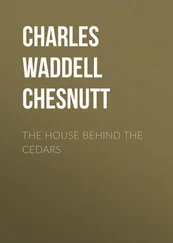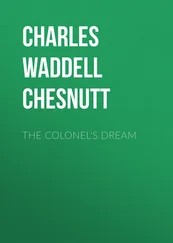Charles Waddell Chesnutt - The Conjure Woman
Здесь есть возможность читать онлайн «Charles Waddell Chesnutt - The Conjure Woman» — ознакомительный отрывок электронной книги совершенно бесплатно, а после прочтения отрывка купить полную версию. В некоторых случаях можно слушать аудио, скачать через торрент в формате fb2 и присутствует краткое содержание. Жанр: foreign_prose, foreign_antique, на английском языке. Описание произведения, (предисловие) а так же отзывы посетителей доступны на портале библиотеки ЛибКат.
- Название:The Conjure Woman
- Автор:
- Жанр:
- Год:неизвестен
- ISBN:нет данных
- Рейтинг книги:4 / 5. Голосов: 1
-
Избранное:Добавить в избранное
- Отзывы:
-
Ваша оценка:
- 80
- 1
- 2
- 3
- 4
- 5
The Conjure Woman: краткое содержание, описание и аннотация
Предлагаем к чтению аннотацию, описание, краткое содержание или предисловие (зависит от того, что написал сам автор книги «The Conjure Woman»). Если вы не нашли необходимую информацию о книге — напишите в комментариях, мы постараемся отыскать её.
The Conjure Woman — читать онлайн ознакомительный отрывок
Ниже представлен текст книги, разбитый по страницам. Система сохранения места последней прочитанной страницы, позволяет с удобством читать онлайн бесплатно книгу «The Conjure Woman», без необходимости каждый раз заново искать на чём Вы остановились. Поставьте закладку, и сможете в любой момент перейти на страницу, на которой закончили чтение.
Интервал:
Закладка:
Charles W. Chesnutt
The Conjure Woman
THE GOOPHERED GRAPEVINE
Some years ago my wife was in poor health, and our family doctor, in whose skill and honesty I had implicit confidence, advised a change of climate. I shared, from an unprofessional standpoint, his opinion that the raw winds, the chill rains, and the violent changes of temperature that characterized the winters in the region of the Great Lakes tended to aggravate my wife's difficulty, and would undoubtedly shorten her life if she remained exposed to them. The doctor's advice was that we seek, not a temporary place of sojourn, but a permanent residence, in a warmer and more equable climate. I was engaged at the time in grape-culture in northern Ohio, and, as I liked the business and had given it much study, I decided to look for some other locality suitable for carrying it on. I thought of sunny France, of sleepy Spain, of Southern California, but there were objections to them all. It occurred to me that I might find what I wanted in some one of our own Southern States. It was a sufficient time after the war for conditions in the South to have become somewhat settled; and I was enough of a pioneer to start a new industry, if I could not find a place where grape-culture had been tried. I wrote to a cousin who had gone into the turpentine business in central North Carolina. He assured me, in response to my inquiries, that no better place could be found in the South than the State and neighborhood where he lived; the climate was perfect for health, and, in conjunction with the soil, ideal for grape-culture; labor was cheap, and land could be bought for a mere song. He gave us a cordial invitation to come and visit him while we looked into the matter. We accepted the invitation, and after several days of leisurely travel, the last hundred miles of which were up a river on a sidewheel steamer, we reached our destination, a quaint old town, which I shall call Patesville, because, for one reason, that is not its name. There was a red brick market-house in the public square, with a tall tower, which held a four-faced clock that struck the hours, and from which there pealed out a curfew at nine o'clock. There were two or three hotels, a court-house, a jail, stores, offices, and all the appurtenances of a county seat and a commercial emporium; for while Patesville numbered only four or five thousand inhabitants, of all shades of complexion, it was one of the principal towns in North Carolina, and had a considerable trade in cotton and naval stores. This business activity was not immediately apparent to my unaccustomed eyes. Indeed, when I first saw the town, there brooded over it a calm that seemed almost sabbatic in its restfulness, though I learned later on that underneath its somnolent exterior the deeper currents of life—love and hatred, joy and despair, ambition and avarice, faith and friendship—flowed not less steadily than in livelier latitudes.
We found the weather delightful at that season, the end of summer, and were hospitably entertained. Our host was a man of means and evidently regarded our visit as a pleasure, and we were therefore correspondingly at our ease, and in a position to act with the coolness of judgment desirable in making so radical a change in our lives. My cousin placed a horse and buggy at our disposal, and himself acted as our guide until I became somewhat familiar with the country.
I found that grape-culture, while it had never been carried on to any great extent, was not entirely unknown in the neighborhood. Several planters thereabouts had attempted it on a commercial scale, in former years, with greater or less success; but like most Southern industries, it had felt the blight of war and had fallen into desuetude.
I went several times to look at a place that I thought might suit me. It was a plantation of considerable extent, that had formerly belonged to a wealthy man by the name of McAdoo. The estate had been for years involved in litigation between disputing heirs, during which period shiftless cultivation had well-nigh exhausted the soil. There had been a vineyard of some extent on the place, but it had not been attended to since the war, and had lapsed into utter neglect. The vines—here partly supported by decayed and broken-down trellises, there twining themselves among the branches of the slender saplings which had sprung up among them—grew in wild and unpruned luxuriance, and the few scattered grapes they bore were the undisputed prey of the first comer. The site was admirably adapted to grape-raising; the soil, with a little attention, could not have been better; and with the native grape, the luscious scuppernong, as my main reliance in the beginning, I felt sure that I could introduce and cultivate successfully a number of other varieties.
One day I went over with my wife to show her the place. We drove out of the town over a long wooden bridge that spanned a spreading mill-pond, passed the long whitewashed fence surrounding the county fair-ground, and struck into a road so sandy that the horse's feet sank to the fetlocks. Our route lay partly up hill and partly down, for we were in the sand-hill county; we drove past cultivated farms, and then by abandoned fields grown up in scrub-oak and short-leaved pine, and once or twice through the solemn aisles of the virgin forest, where the tall pines, well-nigh meeting over the narrow road, shut out the sun, and wrapped us in cloistral solitude. Once, at a cross-roads, I was in doubt as to the turn to take, and we sat there waiting ten minutes—we had already caught some of the native infection of restfulness—for some human being to come along, who could direct us on our way. At length a little negro girl appeared, walking straight as an arrow, with a piggin full of water on her head. After a little patient investigation, necessary to overcome the child's shyness, we learned what we wished to know, and at the end of about five miles from the town reached our destination.
We drove between a pair of decayed gateposts—the gate itself had long since disappeared—and up a straight sandy lane, between two lines of rotting rail fence, partly concealed by jimson-weeds and briers, to the open space where a dwelling-house had once stood, evidently a spacious mansion, if we might judge from the ruined chimneys that were still standing, and the brick pillars on which the sills rested. The house itself, we had been informed, had fallen a victim to the fortunes of war.
We alighted from the buggy, walked about the yard for a while, and then wandered off into the adjoining vineyard. Upon Annie's complaining of weariness I led the way back to the yard, where a pine log, lying under a spreading elm, afforded a shady though somewhat hard seat. One end of the log was already occupied by a venerable-looking colored man. He held on his knees a hat full of grapes, over which he was smacking his lips with great gusto, and a pile of grapeskins near him indicated that the performance was no new thing. We approached him at an angle from the rear, and were close to him before he perceived us. He respectfully rose as we drew near, and was moving away, when I begged him to keep his seat.
"Don't let us disturb you," I said. "There is plenty of room for us all."
He resumed his seat with somewhat of embarrassment. While he had been standing, I had observed that he was a tall man, and, though slightly bowed by the weight of years, apparently quite vigorous. He was not entirely black, and this fact, together with the quality of his hair, which was about six inches long and very bushy, except on the top of his head, where he was quite bald, suggested a slight strain of other than negro blood. There was a shrewdness in his eyes, too, which was not altogether African, and which, as we afterwards learned from experience, was indicative of a corresponding shrewdness in his character. He went on eating the grapes, but did not seem to enjoy himself quite so well as he had apparently done before he became aware of our presence.
Читать дальшеИнтервал:
Закладка:
Похожие книги на «The Conjure Woman»
Представляем Вашему вниманию похожие книги на «The Conjure Woman» списком для выбора. Мы отобрали схожую по названию и смыслу литературу в надежде предоставить читателям больше вариантов отыскать новые, интересные, ещё непрочитанные произведения.
Обсуждение, отзывы о книге «The Conjure Woman» и просто собственные мнения читателей. Оставьте ваши комментарии, напишите, что Вы думаете о произведении, его смысле или главных героях. Укажите что конкретно понравилось, а что нет, и почему Вы так считаете.












